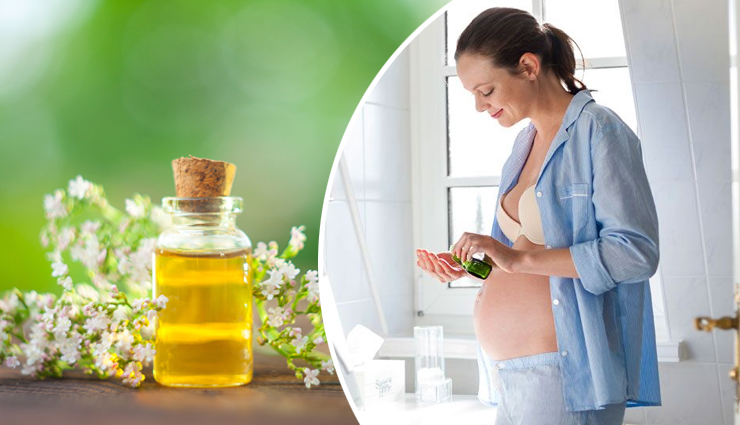- Home›
- Healthy Living›
- 7 Least Known Benefits Of Valerian Essential Oil During Pregnancy
7 Least Known Benefits Of Valerian Essential Oil During Pregnancy
By: Priyanka Maheshwari Fri, 12 May 2023 11:14:39

Valerian essential oil is derived from the roots of the Valeriana officinalis plant, which has been used for centuries for its medicinal properties. It is known for its calming and sedative effects, making it a popular choice for promoting relaxation and sleep. However, when it comes to the use of valerian essential oil during pregnancy, caution is advised.
Pregnancy is a sensitive period where the health and well-being of both the mother and the developing baby need to be carefully considered. While valerian essential oil may have potential benefits, it is important to consult with a healthcare professional before using it during pregnancy.
One of the main concerns with valerian essential oil is its sedative properties. The oil's ability to promote relaxation and sleep can potentially affect the central nervous system of both the mother and the baby. This can lead to excessive drowsiness, dizziness, and impaired coordination, which may pose risks, especially during activities that require alertness.
Another aspect to consider is the limited research available on the safety of valerian essential oil specifically during pregnancy. While valerian root in its natural form has a long history of traditional use and is generally regarded as safe for short-term use, the concentrated form of essential oil may have different effects.
Furthermore, there is a lack of conclusive scientific evidence regarding the effects of valerian essential oil on pregnancy outcomes or fetal development. Due to these uncertainties, it is generally recommended to err on the side of caution and avoid using valerian essential oil during pregnancy, particularly during the first trimester when the baby's organs are forming.
It's important to note that each pregnancy is unique, and what may be safe for one person may not be suitable for another. Therefore, it is crucial to consult with a healthcare professional, such as an obstetrician or a certified aromatherapist, who can provide personalized guidance based on your specific circumstances.
In summary, valerian essential oil has sedative properties that may have potential risks during pregnancy. Due to the limited research and uncertainties surrounding its safety, it is advisable to avoid using valerian essential oil during pregnancy and seek professional advice for alternative approaches to promote relaxation and manage sleep-related concerns.

# Cures Insomnia and Improves Healthy Sleep Pattern
The study titled "Valerian for Insomnia: A Comprehensive Review of Randomized Clinical Trials" published in the medical research journal Sleep Medicine proposes that valerian root possesses muscle-relaxing properties and can alleviate hyperactivity in the body and mind. Adequate sleep enhances brain functionality and boosts energy levels for daily activities. By consuming valerian oil within a regulated dosage of 400 mg to 1000 mg, tailored to individual medical history and physical characteristics, insomnia can be alleviated, leading to a 20-minute reduction in the time taken to fall asleep compared to usual.

# May Reduce Mental Stress and Depression
Pregnancy can bring about significant stress due to the financial and emotional responsibilities associated with becoming a mother. The transformative nature of pregnancy can result in limitations on activities that were previously enjoyable, such as vigorous dancing. Additionally, substantial lifestyle adjustments, including dietary changes and abstaining from alcohol and smoking, can contribute to feelings of loneliness and depression. In such circumstances, valerian oil can provide a calming effect that aids in alleviating mental stress and fostering relaxation.

# May Improve Digestive Function
Pregnancy often leads to a decrease in the normal efficiency of the digestive system. The secretion of digestive enzymes may be reduced, resulting in increased difficulty in digesting food. Hormonal changes during pregnancy can disrupt the smooth functioning of digestion and contribute to symptoms such as gas buildup, indigestion, and acidity. Valerian oil can help alleviate these issues by relaxing the digestive muscles, improving nutrient absorption, and preventing constipation and acidity.

# Helps to Moisturize the Skin and Helps with Stretch Marks
Valerian oil is a popular ingredient in skincare products due to its moisturizing and nourishing properties. It effectively prevents the development of sores and the occurrence of flaky, dry skin that is prone to cracking. You can incorporate valerian oil into your skincare routine by combining it with your regular moisturizer or cream, applying it to your face and belly. However, if you have a history of sensitive skin, it is advisable to consult with a dermatologist before using valerian oil in your skincare regimen.

# Helps to Improve Bone Health and reduces pain due to swollen feet
Osteoporosis is a prevalent condition among women, and during pregnancy, the body requires an increased intake of nutrients and minerals. Calcium plays a crucial role in maintaining bone health. In addition to consuming a diet rich in calcium, the root of the valerian plant contains compounds that enhance bone strength and alleviate pain, particularly in the swollen areas near the ankles.

# Help Regulate Blood Pressure
Elevated blood pressure can pose risks to the well-being of the baby. A 2013 report published in BMC Complementary and Alternative Medicine suggests that valerian oil, with its soothing anti-inflammatory properties, can assist in stabilizing blood flow in the muscles and contribute to the regulation of blood pressure.

# Help Reduce Frequency of Heart Palpitations
Heart palpitations are a frequent occurrence during pregnancy and can be attributed to factors such as the pressure exerted by the baby on the diaphragm or indigestion. By consuming valerian oil within a controlled dosage, cardiovascular functions can be regulated, thereby reducing the likelihood of experiencing heart palpitations.





